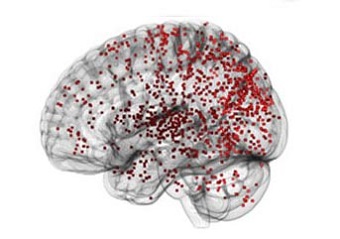Nikhil Prasad Fact checked by:Thailand Medical News Team Jul 29, 2024 8 months, 3 weeks, 6 days, 2 hours, 55 minutes ago
Medical News:
COVID-19’s Hidden Threat - Cerebral Microbleeds
A recent study from researchers at the Tianjin Neurological Institute-China and Tianjin Medical University General Hospital-China reveals that up to one-third of individuals exposed to COVID-19 may develop cerebral microbleeds (CMBs). This startling discovery sheds light on the potential long-term neurological impact of the virus, emphasizing the need for heightened awareness and medical surveillance.
 One-third of all exposed to COVID-19 likely to develop cerebral microbleeds
What Are Cerebral Microbleeds?
One-third of all exposed to COVID-19 likely to develop cerebral microbleeds
What Are Cerebral Microbleeds?
Cerebral microbleeds are small, chronic brain hemorrhages that are typically discovered through advanced magnetic resonance imaging (MRI). These tiny spots of bleeding are often associated with various conditions such as aging, cerebrovascular diseases, and now, as this
Medical News report explains, COVID-19. The presence of CMBs in COVID-19 patients is particularly concerning because it correlates with severe illness, higher mortality rates, and increased risk of further neurological complications.
The Study in Detail
The research team from Tianjin, including Dr Yuchang Wang, Dr Yuetao Hu, Dr Ruichen Zhao, and their colleagues, conducted a comprehensive review of current evidence on CMBs' prevalence, underlying mechanisms, and clinical implications within COVID-19 cohorts. They discovered a significant association between CMBs and severe COVID-19 cases, attributing this to the virus's direct effects, inflammatory responses, and coagulation disturbances.
Mechanisms Behind CMBs in COVID-19 Patients
The study highlights several possible mechanisms for the development of CMBs in COVID-19 patients. One key factor is the hyperinflammatory response, often referred to as a cytokine storm, which can cause widespread endothelial damage and coagulopathy. This pathological environment makes the brain particularly susceptible to microhemorrhages.
Another crucial aspect is the virus's interaction with the angiotensin-converting enzyme 2 (ACE2) receptors found on endothelial cells. This interaction can lead to significant vascular dysfunction, contributing to the formation of CMBs. Additionally, hypoxemia (low blood oxygen levels) commonly seen in severe COVID-19 cases can exacerbate these issues, leading to further brain damage.
Prevalence and Implications
The review found that brain abnormalities, including CMBs, occurred in about one-third of COVID-19 patients examined. These findings are consistent across various studies, although the exact incidence rates can vary depending on the population and clinical conditions. For instance, in some studies, the incidence of CMBs ranged from 21.74% to as high as 63.64%.
CMBs were more frequently observed in critically ill patients, particularly those with acute respiratory distress syndrome (ARDS) or disseminated intravascular coagulation. The lesions were often found in the subcortica
l white matter and corpus callosum, regions vulnerable to inflammatory and hypoxic damage.
However, one study did find that the non-hospitalized COVID-19 patients had a higher risk of developing cerebral microbleeds (CMBs) with an odds ratio of 2.66 for the presence of CMBs compared to non-infected controls, even after adjusting for confounding factors such as age, sex, and comorbidities.
https://pubmed.ncbi.nlm.nih.gov/38887702/
Gender and Age Factors
The study also noted a higher prevalence of CMBs among male patients. However, the limited sample size of some studies suggests that more research is needed to understand the gender-related differences fully. Age is another significant factor, with older individuals showing a higher incidence of CMBs, likely due to the cumulative impact of vascular risk factors over time.
Long-Term Neurological Impact
The presence of CMBs in COVID-19 patients is a marker of severe disease and a predictor of poor neurological outcomes. Patients with CMBs are at a higher risk of subsequent strokes, cognitive impairment, and other neurological deficits. This emphasizes the importance of monitoring neurological health in COVID-19 survivors, even those who experienced mild to moderate symptoms.
Need for Further Research
While the current findings are significant, the variability in study methodologies presents challenges in drawing definitive conclusions. The researchers call for standardized research protocols to better understand the relationship between COVID-19 and CMBs. More extensive and uniform data collection is necessary to refine our knowledge and guide targeted interventions.
Conclusion
The discovery that a substantial portion of COVID-19 patients may develop cerebral microbleeds is a critical addition to our understanding of the virus's impact. This finding underscores the need for comprehensive neurological assessments in COVID-19 patients and highlights the importance of long-term follow-up care.
The study findings were published in the peer-reviewed journal: Brain Communications.
https://academic.oup.com/braincomms/advance-article/doi/10.1093/braincomms/fcae236/7717184
For the latest about COVID-19 induced cerebral microbleeds, keep on logging to Thailand
Medical News.
Read Also:
https://www.thailandmedical.news/news/new-non-human-primate-study-alarmingly-reveals-that-sars-cov-2-infections-can-lead-to-brain-inflammation,-brain-hypoxia,-brain-bleeding-and-also-strok
https://www.thailandmedical.news/news/cerebral-microbleeds-increases-risk-of-stroke-or-dementia
